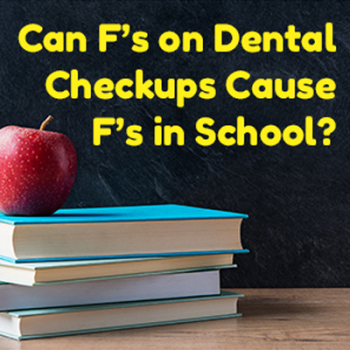Blog
Can F’s on Dental Checkups Cause F’s in School?
 Going to school and getting an education are essential components of a child’s development, and they take the things they learn with them for the rest of their lives. No matter what type of school children attend, their support system at home has a great deal to do with not only their feelings about school but how well they perform there.
Going to school and getting an education are essential components of a child’s development, and they take the things they learn with them for the rest of their lives. No matter what type of school children attend, their support system at home has a great deal to do with not only their feelings about school but how well they perform there.
You may be surprised to learn that children with favorable oral health are more likely to achieve success in school. School attendance is integral to academic achievement, but dental conditions are to blame for 51 million lost school hours among children every year—and dental pain is linked to poorer performance when kids do make it to class. Lexington dentist, Dr. Alisha Patel at Hamburg Family Dental, shares more about this topic below.
Research Finds…
A 2008 study conducted by the North Carolina Child Health Assessment and Monitoring Program examined risk factors for poor performance among school-aged children. Risk factors included school absences and performance, oral health status, parental education level, health insurance coverage, race, and gender.
Children in poor oral health were three times as likely to miss school due to dental pain; school absences from dental pain were linked to poor school performance, while school absences from routine dental care showed no correlation between poor school performance and missing class.
The study ultimately classified children in poor oral health as being up to 40 percent more likely to have trouble in school, further citing low levels of parental education, low socioeconomic status, and below-average overall health to poor academic performance. The study concluded that the improvement of children’s oral health status could be a vehicle to enhance their school experience and progress.
The American Journal of Public Health expanded on the North Carolina study in a 2011 article, acknowledging that former U.S. Surgeon General, C. Everett Koop, had officially acknowledged the relationship between oral health and overall health as far back as the early 1980s and that subsequent health officials had reinforced that acknowledgment. The 2011 article indicated that dental caries (cavities) in children are the most prevalent childhood disease, occurring 5 to 8 times more often than asthma, the second most common childhood illness. Chronic illness affects the quality of life—and for most children, life includes school.
School-Based Oral Health Programs
Some schools have taken steps to promote better oral hygiene among students. School-based programs like these may include oral health education, fluoride rinses, dental screenings, and even dental sealants to prevent tooth decay. The advantage of programs like these is that they reach children who may not have access to pediatric dentistry, but they are only available in regions with the financial resources to sustain them.
Good Oral Health Habits Start at Home
Good oral hygiene is the foundation of oral health and wellness. Brushing at least twice and flossing once daily is a great place to start. Drinking and rinsing with water after meals and snacks can also make the mouth a little cleaner between brushing.
If you have any questions about oral health and your child’s school performance, your Lexington dentist at Hamburg Family Dental can help you find answers. Give us a call or schedule an appointment with us today!
The content of this blog is not intended to be a substitute for professional medical advice, diagnosis, or treatment. Always seek the advice of qualified health providers with questions you may have regarding medical conditions.
